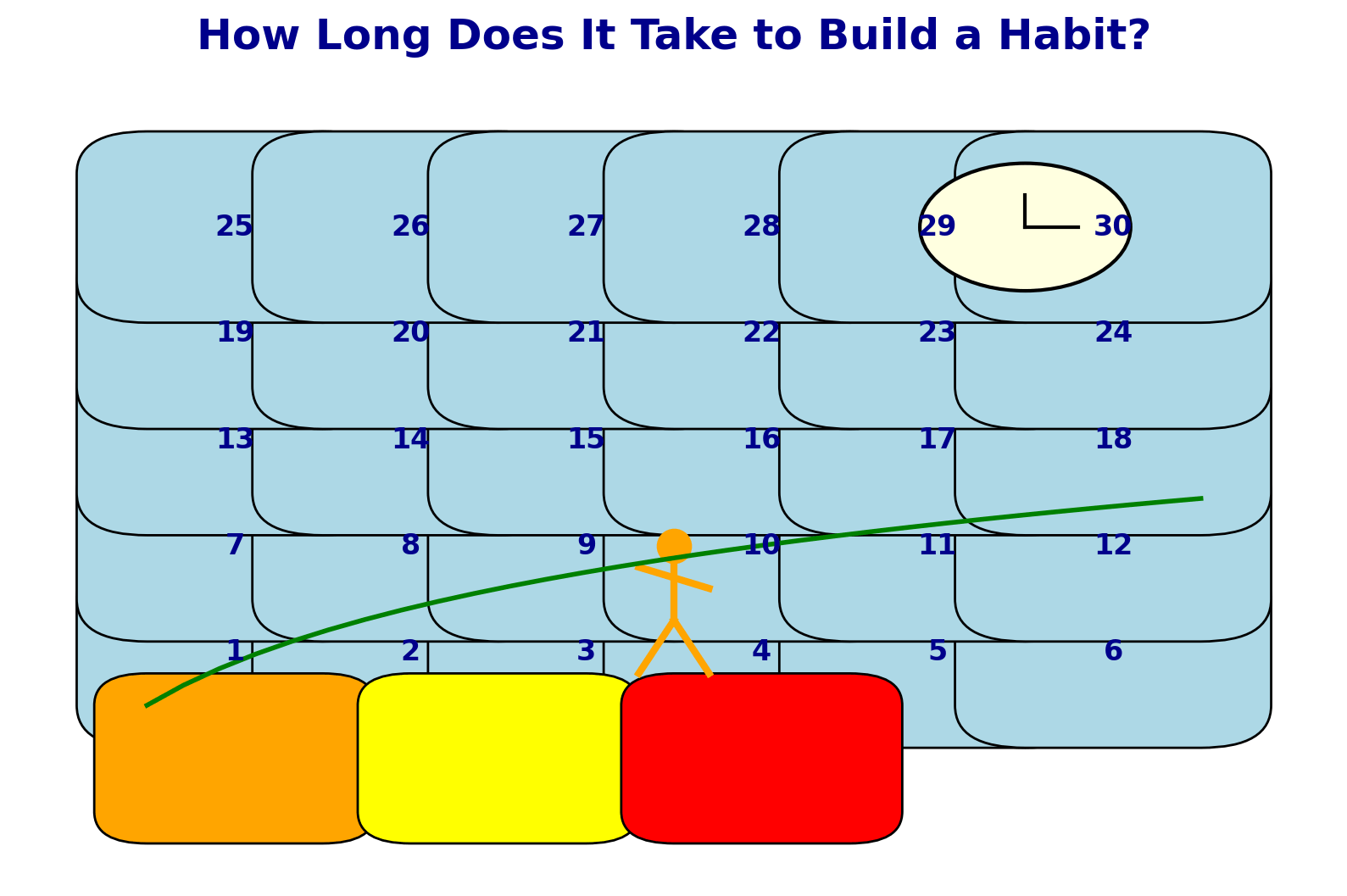
Writer Habit Tracker
How long does it take to build a habit?
Habits building is essential for achieving long-term goals and personal development. But how long does it take to build a habit? This question has intrigued psychologists, self-help gurus, and individuals alike. In this article, we will explore various aspects of habit formation.

The 21-Day Myth
One of the most pervasive beliefs about how long it takes to build a habit is that it only takes 21 days. This idea originated from Dr. Maxwell Maltz, a plastic surgeon who noticed that his patients seemed to adapt to changes in their appearance or new routines in about three weeks. In his book "Psycho-Cybernetics," Maltz wrote about his observations, and over time, his words were misinterpreted and generalized.
Modern Research on Habit Formation
More recent research about how long it takes to build a habit, shows that the 21-day rule is not a one-size-fits-all answer. Phillippa Lally, a health psychology researcher at University College London, conducted a study on habit formation and found that the average time it takes to form a new habit is 66 days. However, this number can vary significantly depending on the complexity of the habit and individual differences.
Factors Influencing Habit-building
- Complexity of the Habit: simple habits like drinking a glass of water every morning may take less time to form compared to more complex habits like exercising daily.
- Consistency: regular repetition is key. Missing a day here and there won't completely derail the process, but consistency accelerates habit formation.
- Individual Differences: personal motivation, lifestyle, and even genetic factors can influence how quickly a person forms a habit.
How long does it take? Common Time Frames for Habit Building
- 21 Days: this is the myth propagated by Maltz’s observations.
- 66 Days: Lally’s research indicates this as an average time frame.
- Range of 18 to 254 Days: Lally’s study also found a wide range, suggesting that the time it takes to create a habit can vary greatly from person to person.
Breaking Bad Habits
Understanding how long it takes to break a bad habit is just as important as forming a new one. The process can be longer and more challenging due to ingrained behaviors and emotional attachments. Strategies for breaking bad habits include:
- Identifying Triggers: Recognize what prompts the bad habit.
- Substitution: Replace the bad habit with a healthier one.
- Support System: Seek support from friends, family, or support groups.
The Habit Formation Process
The process of developing a habit involves several stages:
- Cue: a trigger that initiates the behavior.
- Routine: the behavior itself.
- Reward: the benefit you gain from the behavior.
Understanding how long this cycle can help in strategically forming new long-term habits and breaking old ones. For instance, if your goal is to form a new habit of exercising daily, identify a cue (like a specific time of day), establish the routine (the workout itself), and then enjoy a reward (such as a healthy snack or a sense of achievement).
Tips for Successful Habit Formation
- Start Small: begin with manageable changes. How long? For example, instead of committing to a 60-minute workout, start with 10 minutes. Stay Consistent: Aim to perform the new habit daily. Consistency reinforces the new behavior. Track Your Progress: Use a journal or an app to monitor your progress. Be Patient: Understand that forming a new habit takes time and persistence.
- Stay Consistent: aim to perform the new habit daily. Consistency reinforces the new behavior.
- Track Your Progress: use a journal or an app to monitor your progress.
- Be Patient: understand that forming a new habit takes time and persistence.
Practical Examples
Drinking More Water
If your goal is to drink more water, start by adding an extra glass with each meal. Over time, this can become an automatic part of your routine.
Reading Daily
Set a goal to read for 10 minutes before bed each night. Gradually, this can become a long-term habit.
Exercise
Begin with a short, daily workout. As it becomes a habit, you can increase the duration and intensity.
Conclusion
In conclusion, the time it takes to form a habit varies widely among individuals and depends on the nature of the habit. While the myth of 21 days to form a habit persists, research shows that the average time is closer to 66 days, with a range that can extend to 254 days. Key factors include the complexity of the habit, individual consistency, and personal differences.
By understanding how long this process takes and employing strategic approaches, anyone can create new, healthy habits and break old, detrimental ones. Remember, patience and persistence are crucial in this journey.
